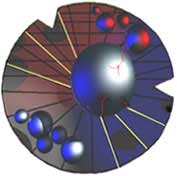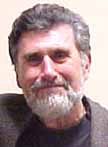 |
THE MACULAR
|
 |
THE MACULAR
|

|
Name Born Home Diagnosis Eyes Affected Eye Color Age at Diagnosis Visual Acuity Treatment Prognosis or Current State of
Vision Family History Impact on My Life In spite of these difficulties, I steadfastly refuse to let the disease get me down. I am working hard to soldier through and continue to do the work that I love to do--and that I think is important for society. Perhaps the greatest negative impact the disease has had on my life is that I can no longer see, with clarity, the faces of the people I love. To take one poignant example, when I play with my breathtakingly beautiful 4-year old granddaughter (the apple of my eye!), her face has begun to look as though I am viewing it in a fun-house mirror (some fun!). Over the past two years, I have learned that I can adjust to almost anything. But this aspect of the disease continues to break my heart on a daily basis. Positive Effects I have learned a lot about myself. As my eyesight has continued to deteriorate, I have learned that I can adapt to almost anything. (As one of my children put it, " You are maintaining your "vision" even as you are losing your eyesight!"). I have learned that I can be both honest and cheerful around my family and friends. That is, I don't try to minimize the difficulty of what I am going through; I don't lie to them about the pain I am experiencing. At the same time, I don't complain about it--and I have even learned to joke about it--because I find that humor is a powerful and positive ally. It not only makes me feel better but it also helps my loved ones feel more comfortable and less sad when they are with me. Adaptations I can still drive a little (20 miles an hour in daylight, in the city--with my weaker eye closed). I anticipate that it will be very difficult when I am forced to give up driving entirely. I am blessed with a wonderful support system. I continue to enjoy interacting with my friends, my loving wife, my four children and my nine grandchildren. I have learned to magnify words on my computer and use magnification and good lighting to do my work. I have learned to approach strangers to ask for their help (for example, in reading signs and monitors at airports). I am looking into the fancier devices like Max and Jordy for possible use. My spirits are very high. The RS who first diagnosed me knew his stuff but had the compassion of a toad. He simply said that I had AMD, that there was nothing they could do for me, and that I would most probably lose from 70-90% of my vision. For the first few weeks after the diagnosis I went into a deep depression--and into panic. I would wake up in the middle of the night in a cold sweat thinking, "if it's this bad now, what's it going to be like in two or three years?" I taught myself to stop thinking about the future and to take it a day at a time. To learn to enjoy my limited vision to the fullest--and to come to the full realization that I am more than my eyes--that, in the worst case, I could still enjoy my life. More About Me |
| MD
Support Home Page Back to The Macular Degeneration Community |